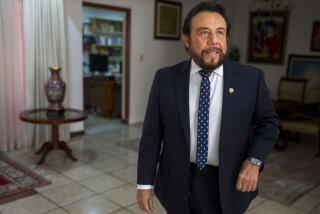El Salvador’s Military Chief Steps Aside
- Share via
SAN SALVADOR — Gen. Adolfo Blandon, a key architect of restructuring and reforming the Salvadoran military, is being replaced as chief of staff by a field commander known for his effort to win the hearts and minds of the people through aid and not just with arms.
Blandon, 50, went on national television late Saturday night to announce that as of Tuesday, he is being assigned as military attache in France and will be replaced by Col. Rene Emilio Ponce, currently commander of the army’s 3rd Brigade.
Blandon took over as chief of staff in 1983 at a time when the Salvadoran military, best known for its brutal but ineffectual tactics, was losing a war against a tough leftist guerrilla force known as the Farabundo Marti National Liberation Front, or the FMLN.
Expanded the Military
Benefiting from U.S. military advisers and a U.S. aid program totaling hundreds of millions of dollars, Blandon increased the military from 12,000 soldiers into a force of nearly 60,000. It has been able to prevent a guerrilla victory, although falling short of defeating the rebels.
The replacement of Blandon was expected. He had been under pressure to leave because younger officers felt they were being denied opportunities for advancement as long as he stayed in office.
In spite of his record for improving the army’s military performance and clamping down on its human rights abuses, Blandon had not been able to persuade several older field commanders of the need to modernize battle tactics against the tough and mobile guerrilla forces.
Ponce, 41, who is highly regarded by the U.S. Embassy, is being elevated over several senior officers and is widely regarded as the next choice for minister of defense when a new government takes over next June.
In a recent interview, Ponce said: “This war can’t be won militarily. We have to convince the people that the government has the answers to their economic problems.”
Under his command, the 3rd Brigade in war-torn San Miguel province has attempted to win the allegiance of the local peasants by building schools and medical clinics and establishing a military presence in areas largely under rebel control.
“His war is 70% hearts and minds and 30% military,” according to a European diplomat.
Aggressive, Mobile Force
Ponce also accepts the American military view that the Salvadoran army must be more aggressive and mobile, seeking out the guerrillas, fighting at night and using full-time small patrols. It is what American advisers call a low-intensity war.
Blandon said in his broadcast that “this is the right time for the change. Personally, I believe that Col. Ponce is very capable.”
Ponce takes over at a time when his approach will be severely tested. The guerrillas, at least for the time being, have abandoned large-scale attacks on military targets in favor of intensified but small-scale raids against small posts, sabotage and urban terrorism.
This has led over the last month to the bloodiest violence in El Salvador in the last two years and has brought calls from rightists for a tougher response.
This is the object of the FMLN, according to guerrilla sources and military experts: to provoke the Salvadoran military into repeating its past brutality against not only FMLN fighters but anyone suspected of sympathizing with the rebels.
“The idea is to make the army behave so badly that it will lose American support and spark a popular insurrection,” according to a Latin American military expert.
“Ponce says he can fight this kind of strategy without brutal methods, but there are a lot of officers who think the only way is to wipe out all opposition,” the expert said.
“It also remains to be seen if those officers who are jealous of his rapid advancement will support him.”
More to Read
Sign up for Essential California
The most important California stories and recommendations in your inbox every morning.
You may occasionally receive promotional content from the Los Angeles Times.













